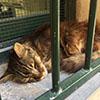Sunday Post 10.4
By han yuOctober 4, 2015 - 14:19

Fraden says, “The eye of every beholder is not disciplined. And this finally is what makes the Medea Project Wild, on the edge, not entirely didactic, and never the same”. This quote sticked out to my mind after I heard people in our class talking about that in theater we are creating “characters” that “exaggerate” the stereotypes of those women. However, I really want to point out that, different people would have different versions of interpretation toward the same performance. And the audiences of the Medea Project, like us being self-selected in this 360, are the people who genuinely care about social injustices.







